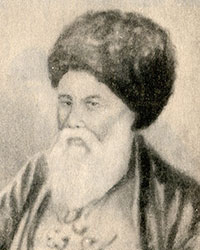SHARE WITH FRIENDS:
 Kamil Khorezmi (pseudonym; real name Pahlavon Muhammadniyaz Abdulla Akhund oglu) (1825 - Khiva - 1899) - Uzbek poet, calligrapher, musicologist, translator and statesman. He was one of the first propagandists of world culture in Khorezm. He studied at the Khiva madrasah. Fluent in Arabic and Persian. He diligently studied the works of representatives of Oriental literature, classical music, the secrets of calligraphy.
Kamil Khorezmi (pseudonym; real name Pahlavon Muhammadniyaz Abdulla Akhund oglu) (1825 - Khiva - 1899) - Uzbek poet, calligrapher, musicologist, translator and statesman. He was one of the first propagandists of world culture in Khorezm. He studied at the Khiva madrasah. Fluent in Arabic and Persian. He diligently studied the works of representatives of Oriental literature, classical music, the secrets of calligraphy.
At the age of 25-30 he was known as a poet. Agahi included his name in his book Gulshani Davlat. Khan of Khiva was the secretary of Sayyid Muhammad Khan's palace. Muhammad Rahim II promoted him to the post of mirzabashi. The armistice signed between Russia and the Khiva khanate (Gandhimian treaty) was written by Kamil Khorezmi (1873). Later he worked in the palace as a devanbegi (1873-80), mirzaboshi (from 1880). He was the first to establish a printing house in Khorezm (1880-81).
Kamil Khorezmi sponsored the development of classical music of the East, in particular, the traditions of maqom, and introduced a system of notes called "Tanbur line" for recording Uzbek melodies. In this peculiar note he wrote the head of the "True" status. His son Mirzo Muhammadrasul continued the work started by his father and wrote the rest of the songs and instruments of Khorezm "Shashmaqom". The notes of "Murabbai Komil" and "Peshravi Feroz" melodies connected with the status of "Truth" have reached us.
Kamil Khorezmi traveled to Moscow and St. Petersburg twice (2, 1873). In 1883, 1891-1896 he came to Tashkent and wrote a poem about cultural innovations "Narrow description and description of Tashkent" ("In the description and description of Tashkent"). This poem is one of the first major works of poetry in Uzbek literature, which reflects the social development, in which a new, modern culture is glorified.
Kamil Khorezmi wrote lyrical poems and composed devons in the spirit of the traditions of classical poets of the East. There are more than 8000 poems in this divan, which are written in genres such as ghazal, murabba, muhammas, musaddas, masnavi, rubai, qasida, problema. They glorify true human qualities, condemn ignorance, and glorify love. Kamil Khorezmi's works in almost all genres have a wide place for social criticism, some of his poems have risen to the level of aphorisms ("Falak oppression is one side, one side alar…", etc.).
Sheikh Suleiman Bukhari in his famous work "Dictionary of Chigatoy and Turkic Ottoman" ("Chigatoy and Ottoman Turkish Dictionary") used the work of Kamil Khorezmi and explained the meaning of many words in the Khorezm dialect through his poems. Kamil Khorezmi wrote in 1865 Barkhurdor bin Mahmud Turkmen Farahiynm (literary pseudonym Mumtoz) "Mahbub ul-qulub" (this work is also called "Mahfiloro" - "Adornment to the Assembly" in some sources) and in 1869-70 Fakhriddin Ali Sayfi's "Latoy-if at-tavoyif ”(“ Anecdotes of various categories ”) translated from Persian into Uzbek. Alisher Navoi wrote the foreword to the first Khorezm lithographic edition of "Khamsa". Manuscripts of Kamil Khorezmi devon are kept in the manuscript fund of the Institute of Oriental Studies of the Academy of Sciences of Uzbekistan (inv. 1849, 1025).
M.Yunusov, F.Karimov, A.Hayitmetov, and other scientists studied the works of Kamil Khorezmi.